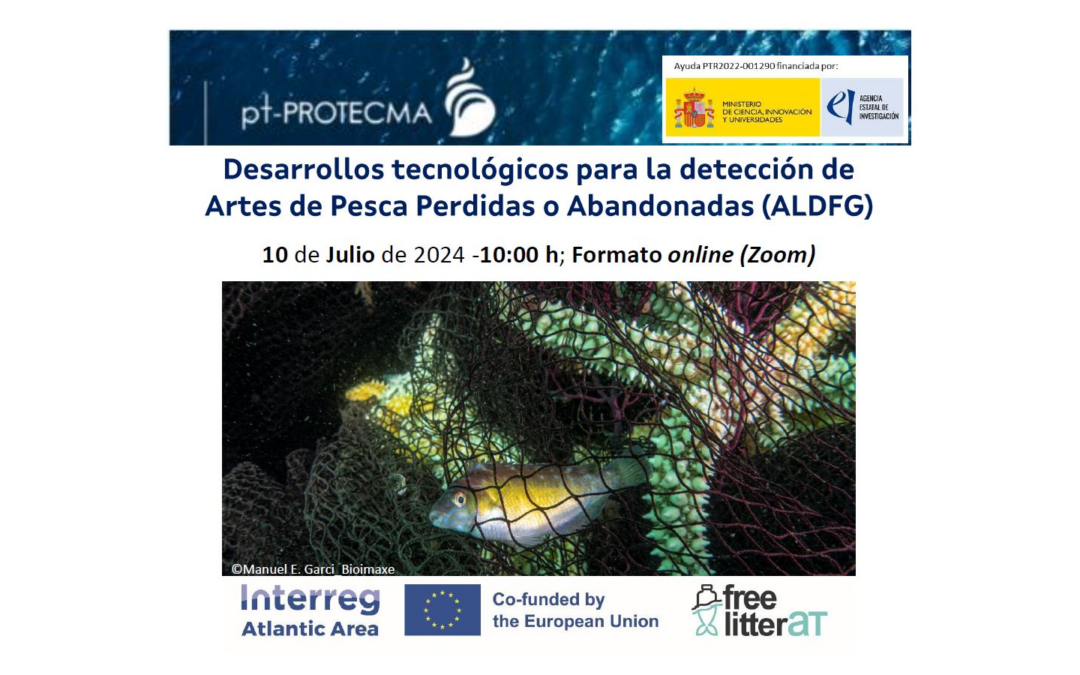On Wednesday, July 10, from 10:00 to 14:00, the Spanish Technological Platform PROTECMA organised, in collaboration with Free LitterAT the webinar “Technological developments for the detection of Lost or Abandoned Fishing Gear (ALDFG)”
This technical conference aimed to explore and propose innovative solutions and technologies for the detection of ALDFG, as well as to promote and identify initiatives, technological developments and public-private collaborations to face the challenges posed by this environmental threat and its impacts on the conservation of biodiversity and the marine environment.
The conference was attended by 45 participants and counted on presentations focused on the management of ALDFG, the development of technologies for detecting, monitoring and removing derelict fishing gears, pilot actions carried out to remove them and to reduce the impacts of this type of litter in the marine environment,
During the conference, the experts addressed several important issues, such as the need to implement regulations for controlling fishing gear and improving its traceability, the importance of using applications to report findings, the necessity of evaluating the cost-benefit ratio to plan removal actions and the importance of collaborating with fishermen and diving clubs to locate and remove abandoned gears.
The presentations of the conference are available in the links below:
- Actividades realizadas y perspectiva de nuevas acciones en el marco de las líneas de trabajo de PROTECMA. Marisa Fernández, Anxo Mena, Coordinación PT PROTECMA, Fundación CETMAR
- Free LitterAT project- Advancing towards litter-free Atlantic coastal communities by preventing and reducing macro and micro litter. Marisa Fernández, Fundación CETMAR
- Gestión de hallazgos de artes perdidos o abandonados. Marta Martínez-Gil, MITERD
- Uso de Ecosonda Multihaz y Sonar de Barrido Lateral para la detección de Artes de Pesca Perdidas o Abandonadas. Alejandro Palmeiro, Nautilus Oceanica
- Equipos Acústicos para la Localización de Artes y Aparejos de Pesca. César Carro, KONGSBERG – Protecting People and Planet.
- Técnicas acústicas útiles en la detección de objetos y rastros en el fondo. Kais Jacob Mohamed Falcón, Centro de Investigación Mariña-Universidade de Vigo
- Implementing Innovative and Scalable solutions and technology to detect, map and monitor ALDFGs. João G. Monteiro, Universidade da Madeira & Mare Madeira
- Iniciativas intermedias a la gestión de APPA: SOS Redes Alborán. David León, Hombre y Territorio
- Estudio de la basura de fondo mediante el uso de vídeos submarinos en el Banco de la Concepción (Islas Canarias). Mónica Incera, Centro Oceanográfico de Vigo, IEO-CSIC.
- Localización, mapeo y retirada de redes perdidas o abandonadas. Proyectos CleanAtlantic y Free Litter AT. José Luis Gómez Gesteira, Fundación CETMAR
- Artes perdidos y arrecifes artificiales. Lucas Moreno Tempestini, Agencia de Gestión Agraria y Pesquera de Andalucía (AGAPA)

